
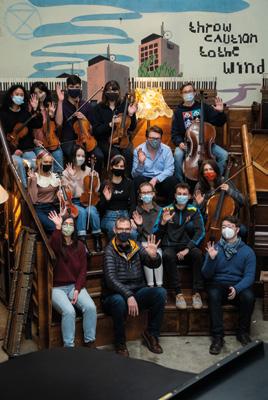


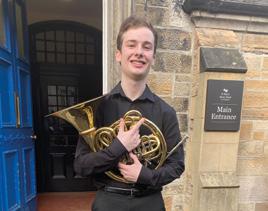
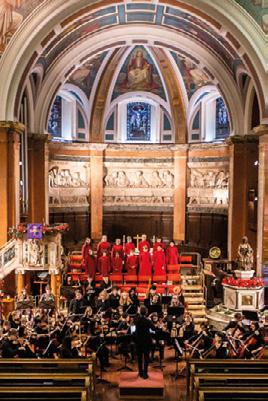
BRINGING MUSIC TO LIFE Annual Review 2021/22 www.stmarysmusicschool.co.uk
CONTENTS
1. DELIVERING ACCESS TO EXCELLENCE | Dr Kenneth Taylor, Headteacher

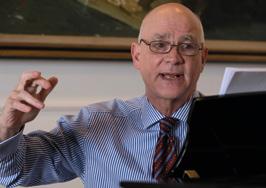
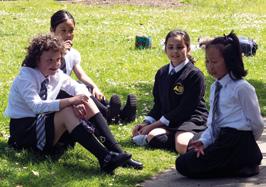
2. NEW MUSICAL EXPERIENCES | Dr Valerie Pearson, Head of Strings
4. A SCHOOL WITH SPIRIT | Philip Higham, Principal Cello, SCO

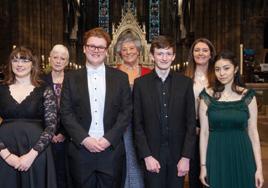
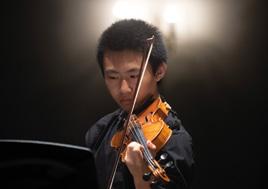
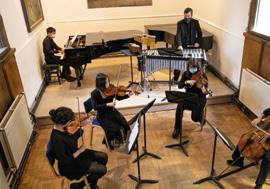
5. LOOKING FORWARD TO CALTON HILL | John Reid, Interim Chief Executive
6. AT A GLANCE | Highlights of 2021/22
8. OUR FINANCIAL PERFORMANCE | Income, expenditure and fee funding for 2021/22
9. CELEBRATING 50 YEARS OF GENEROSITY

“I spent my last two school years at St Mary’s Music School and I wish I’d known about it sooner. I’d have loved to spend far longer with everyone in such a special environment. I could not be more honest when I say these were the best two years of my life, allowing me to focus on improving as a musician and giving me the time and space to do this at my own rate. St Mary’s Music School is truly unique. You are nurtured to be who you are as an individual as well as follow your interests. The staff and pupils are amazing and there is such a good relationship between everyone.”
Amelia, Pupil Head of School 2021/22
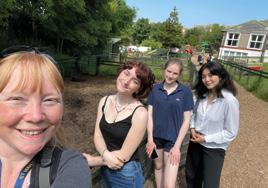
2
DELIVERING ACCESS TO EXCELLENCE
Dr Kenneth Taylor, Headteacher

Thanks to the Scottish Government Aided Places Scheme and the generous support of individual donors and funders, musically talented young people from all over Scotland and the UK can access our specialist music education, regardless of their geographical location or financial circumstances – a great example of delivering access to excellence.
The Scottish Government Aided Places Scheme enables the majority of our instrumentalists, as well as six choristers, to receive the specialist music education we provide at St Mary’s Music School, with their families making an affordable contribution towards school fees. Our remaining chorister pupils receive bursary support from St Mary’s Episcopal Cathedral and it is no exaggeration to state that without the generous provision from the Scottish Government, we simply could not function in our present form. In addition, we receive welcome contributions from organisations and individual donors, including Dunard Fund and The Leverhulme Trust, and this essential inward investment allows us to maintain and develop our unique provision as well as provide further bursary support.
Session 2021/22 can certainly be seen as a transition back to ‘normal’ working conditions following the restrictions and mitigations in place over the past two years. Our school community has adopted a can-do attitude throughout, reflected in another year of outstanding academic results with a 100% A-C pass rate and 83% A grades (post appeal) across all SQA presentations. The inspiring range of places achieved at conservatoires and universities, throughout the UK and beyond, also points to excellent pupil attainment and achievement.
Adapting to unusual circumstances allowed us to develop digital initiatives such as virtual open days and Celebrity 6, which continue today. In the summer term alone, engagements included a violin masterclass from Jack Liebeck, piano recitals from Steven Osborne and Susan Tomes, and an afternoon of musical lectures from Sir James MacMillan. The Seven Hills Project, through the stewardship of Dr Valerie Pearson, Head of Strings, continued with aplomb and we enjoyed three further ‘Hills’ along with special video recordings and poetry recitation from Alexander McCall Smith www.stmarysmusicschool.co.uk/ support-us/the-seven-hills-project.
The end of the 2021/22 session saw our Director of Music, Paul Stubbings, leave to take up the post of Head of Music at Westminster Cathedral Choir School. Paul’s outstanding contribution through his generous spirit, tireless energy, commitment to professional standards and understanding of each pupil’s needs, is hugely appreciated. We also said good-bye to Ruth Martin and Alison Horsey, whose work in Art and Classics, respectively, has been greatly appreciated, and to Eleanor Parker who coordinated our Saturday Music Classes with great success. In the keyboard faculty, Elena Fischer-Dieskau left to focus on her performing career and we welcomed pianist Philip Sharp in her place.
At present, we are fortunate to be able to call on the considerable talents and energy of John Cameron, currently acting as Director of Music, as we begin the process of recruiting St Mary’s Music School’s fifth Director of Music. The new Director will lead the School’s music making as we look forward to the transition from our current home in Coates Hall to new premises at Calton Hill. This promises to be an exciting time, as we collaborate with musicians and organisations in Edinburgh, Scotland and beyond, to ensure we remain at the forefront of music education in the UK and internationally.
In closing, I’d like to look ahead to Monday 26 June 2023, when the School will mark ‘50 Years of Specialist Music Education’ through a special concert in The Queen’s Hall. This will include a piece specially commissioned from Sir James MacMillan and performances by a wide range of our pupils, past and present. It promises to be a unique and very special event, and we hope you will join us for this evening of celebration.
1 ST MARY’S MUSIC SCHOOL Annual Review 2021/22
“Our ability to attract musical luminaries such as Pekka Kuusisto, Anna Meredith, Clifton Harrison and Gillian Moore, to engage with our school community, clearly shows the esteem in which our specialist music education is held within the music profession.”
NEW MUSICAL EXPERIENCES
Dr Valerie Pearson, Head of Strings
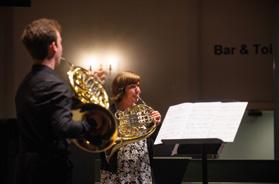
Dr Valerie Pearson joined St Mary’s Music School in August 2020, a time when the many restrictions of the pandemic were still in full force. Here, she takes the opportunity to reflect on the positive changes experienced during the academic year 2021/22 and to look to the future.
“The most obvious difference in the past year has been increased opportunities for live performances. In May, eight pupils joined me to hear James Ehnes perform in Glasgow, on both violin and viola, and to speak with him after the performance, while in June we held an upper strings masterclass with violinist Jack Liebeck – soloist and Emile Sauret Professor of Violin at the Royal Academy of Music – who worked individually with nine of our pupils. I cannot emphasise enough the positive effects that these live encounters with international artists have on our pupils. Looking ahead, we plan to focus more attention on the viola. As the James Ehnes concert clearly demonstrated, more and more violinists are choosing to play the viola to enhance their playing. Additionally, concert repertoire choices are bringing the viola more into the limelight and we already have this year’s S6 violinists engaged in additional viola lessons as we set about a greater task – getting more violinists in Scotland to take up the instrument!
In recent times we have seen a huge development in what a professional musician is and does, in response to the shifting musical landscape. As funding cuts to music education and arts organisations continue, so does the need for musicians to engage in activities that connect more directly with children, communities and new audiences, in order to make their careers sustainable. We must therefore provide appropriate training, experiences and support for our pupils to prepare and equip them for this path. Pupils at St Mary’s Music School gain experiences in music education through their continued work with SCO Academy, as peer mentors to participants from around the UK, and at our Saturday Music Classes as teaching assistants.
Earlier in the year, I was delighted to bring string staff and pupils together to welcome the composer Martin Suckling and Head of Music Education, Dr Liz Haddon – both from the University of York –to the School to introduce and discuss ‘Òran Fìdhle (Violin Song): Violin duos in instrumental pedagogy’. This is a major academic study exploring the role of duets in instrumental teaching and Martin has composed a series of pedagogical violin duets, based on field recordings of Gaelic Songs held in the online archive Tobar an Dualchais/Kist o Riches. Chetham’s Music School, Sheffield Music Hub and RCS Juniors are also partners in the project, but our own pupils gave the world première performance of four of the duets.
The Seven Hills Project continues to give our pupils new and valuable experiences as they work with living composers and side-by-side with professional performers, and as they learn, absorb and master a new set of performance practice concerns with each successive commissioned work. Following on from the June 2021 performance of Jay Capperauld’s Theory of the Earth (inspired by Arthur’s Seat) our pupils and staff have gone on to premiere Imagined Conversation on Blackford Hill by Tom David Wilson for clarinet quartet, Enlightenment (about Calton Hill) by Neil Tòmas Smith for ensemble, and Braid Hills by Helen Grime MBE for horn duet. As we release performance films of each work online, pupils experience professional audio and film recording practices and there are moments when I must remind myself that the performers are school pupils; their calm and control in this pressured environment is what sets them apart and clearly marks out that they are on the right trajectory for professional life.”
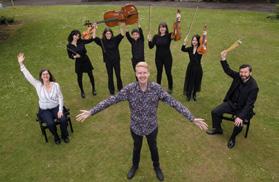
ST MARY’S MUSIC SCHOOL Annual Review 2021/22 2
“Music teaches human beings more than any single human being can ever know or experience. It is an unending journey. I wish for you all… and me, as I travel forward… that music will be our lifelong journey. Music is for everyone.”

Paul Stubbings, Director of Music (from 2012 until 2022)
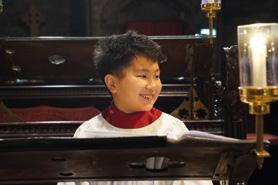





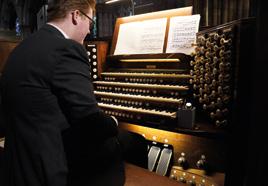
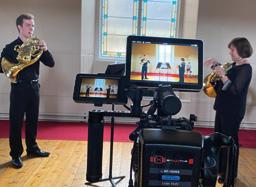
3
ST MARY’S MUSIC SCHOOL Annual Review 2021/22
A SCHOOL WITH SPIRIT
Philip Higham, Principal Cello, Scottish Chamber Orchestra
Philip Higham attended St Mary’s Music School from 1995-2003, studying with Ruth Beauchamp, before leaving for the Royal Northern College of Music. Along with a string of major awards – including being the first UK cellist to win first prize in the Bach Leipzig competition in 2008 – he has performed as a soloist with the Philharmonia Orchestra, Hallé Orchestra, Royal Northern Sinfonia and Bournemouth Symphony Orchestra. Philip was appointed Principal Cello of the SCO in 2016.

What it is about the St Mary’s Music School experience that makes it so special?
Here, my love of music was allowed to flourish over time, and I felt I benefitted from a clear, shared sense of positive values. Looking back at my nine-year-old self, I remember feeling strongly and immediately that the School had spirit: the character of the building, its nooks and crannies, and even its collection of unusual pianos, all distinct from each other in style, quality and condition. All of this appealed to youngsters like me whose creativity and imagination were continually fostered through the discipline and joy of playing music. I believe the School, its ethos and its staff helped me and countless others to cultivate a healthy stance towards music, to trust in what it requires and what it can offer back, and never to fall into the trap of unhealthy competition with oneself or others.
“I remember profound experiences of performing works like The Dream of Gerontius, the Bach Passions or various cantatas at St Mary’s Cathedral... those were certainly an education for the soul.”
Can you describe your musical journey?
After St Mary’s Music School, I accepted a place at the Royal Northern Collage of Music (RNCM) in Manchester, where my wonderful teacher, Emma Ferrand, took my playing apart and (almost!) put it back together. She was the kind of teacher who sometimes offered more questions than answers –exactly what I needed at that time – and maintained a rare openness to her many students’ individual quests. I then studied at postgraduate level with Ralph Kirshbaum, who guided me into another realm in terms of interpretation and performance, pushing me to find further dimensions within my playing and helping me stand on my own feet, musically and professionally. With solo, chamber and teaching experience behind me, I had some success in competitions, including being accepted for YCAT (Young Classic Artists Trust) between 2009 and 2014, which offered fantastic opportunities and helped build my profile in the UK and abroad. I returned to Scotland in 2015, the year before two of my biggest highlights – joining the SCO
as principal cellist, and welcoming our daughter, Alma, into the world. Our son Manus joined us in 2019 and only now – especially given the two years that followed – do I feel able to look at the future with more clarity! Lots of exciting projects with SCO, more investigation of historical performance (alongside early pianos), some directing, possibly conducting...
Tell us about the role you’ll be playing in the School’s 50th Anniversary Concert.
I’m delighted to be performing as a soloist in one of my favourite concertos, the ‘Triple’ by Beethoven –a piece I’ve known since childhood, although thankfully never attempted to play until in my twenties! I’ve always loved its unbridled joy and heroic spirit; that heavenly contemplation of the slow movement, the wit and humour of the finale, and the general brilliance of the solo parts. The cello shines, introducing each of the themes in each movement, and most often in a similar register to the violin… so it can be tricky at times. Fortunately, I’ll be in the best possible company with pianist Steven Osborne and violinist Colin Scobie.
As we emerge from the pandemic, what are your thoughts on the future for the arts – what have we learned and how can we share that learning?
The pandemic was deeply challenging – indeed, horrible – for so many, not least for performing musicians and performance venues. However, I’ve been heartened to see how the public has responded to the ‘reopening’ – somehow our cultural appetite has never seemed more voracious, as witnessed by the recent Edinburgh International and Fringe Festivals, the Lammermuir Festival, and the return of our own audiences to SCO concerts. Much was learned about the possibilities and integration of digital performance and it’s my hope that we can build on the best parts of that in future… but never come to regard it as a valid substitute to live experience. Just as you have not really ‘seen’ a Vermeer painting if viewed only on Google Images, you have not fully ‘experienced’ a Mahler symphony if watched only at home on a screen. We need to preserve that connection between the act of live playing and live listening, and to forge that essential communion between music, musicians and audience. That can be the most potent nourishment for us all.
ST MARY’S MUSIC SCHOOL Annual Review 2021/22 4
LOOKING FORWARD TO CALTON HILL
John Reid, Interim Chief Executive
We are looking forward with great anticipation to the School’s move to the magnificent Old Royal High School building on Edinburgh’s Calton Hill in September 2027, which promises to be an exciting watershed in the School’s history and development. We are extremely grateful to Dunard Fund, who are financing the refurbishment and enabling the School to participate in the project.
The refurbished Hamilton building will be restored as an iconic cultural landmark in Edinburgh, with newly constructed classrooms and boarding facilities incorporating all modern amenities. We look forward to being situated in the heart of Edinburgh and being surrounded by elegant and relaxing gardens. The new site will provide a wonderful opportunity to enhance the already first-class music education provided by St Mary’s Music School and, in addition to increasing student numbers to over 100, we will provide
• 37 dedicated and specialist practice rooms
• a state-of-the-art recording studio and
• a concert hall and recital rooms, designed by a world-leading acoustician.
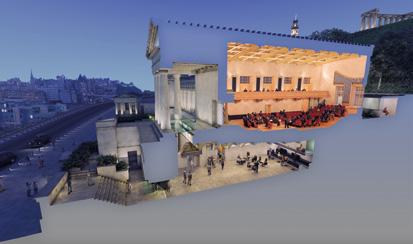
We firmly believe that these facilities will be a beacon to attract ambitious students and the finest musicians and teachers to Edinburgh. In addition, a wide range of musical and cultural activities will take place on campus, enabling our students to participate in, and enjoy, many extra-curricular activities.
In short, the move to Calton Hill, and all that the new campus will offer, will enable us to take our place at the heart of Edinburgh’s and Scotland’s cultural life, and realise our ambition of becoming a world-renowned centre for musical education.
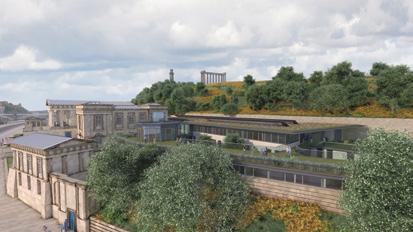
ST MARY’S MUSIC SCHOOL Annual Review 2021/22 5
AT A GLANCE
Highlights of 2021/22
SCHOOL ROLL 2021/22
63 pupils (38 day pupils and 25 boarders)
• Senior instrumentalists 42
• Junior instrumentalists 6
• Senior choristers 6
• Junior choristers 9
PUPIL ORIGINS 2021/22
Scotland (56)
Edinburgh 34 | East Lothian 6
Fife 3 | Midlothian 3 | Dundee 2
Perth & Kinross 2 | Highlands & Islands 2
Dumfries & Galloway 1 | Glasgow 1
Stirlingshire 1 | West Lothian 1
England (2) Overseas (5)
SUBJECT TEACHING
Art & Design | Biology | Chemistry | English | English
for Speakers of Other Languages | French | Geography
German | History | Italian | Latin | Mathematics
Modern Studies | Music | Physical Education | Physics
Religious and Moral Education | Spanish
SCHOOL CLUBS
Ceilidh Celebrations | Chess Club | Debating Group
Eco-Schools | Gardening Club | Mindfulness Mondays
Running Club | Science Club | School Poetry Competition
Scottish Mathematical Challenge | Senior Reading Group
EXAM RESULTS 2021/22
100% pass rate across all exams
SQA National 5 85% at A (post appeal)
SQA Higher 81% at A
SQA Advanced Higher 79% at A
SCHOOL EVENTS
Directors’ Recital Prize for Senior Students
Junior and Intermediate Recital Prizes
Lord Clyde Concerto Competition
Sheila Tough Singing Competition
House Singing Competition
Christmas House Quiz
Sports Day
Literacy Quiz
Scavenger Hunt
INSTRUMENTAL & MUSIC TEACHING
Piano (Classical, Jazz) | Violin (Classical, Baroque)
Viola | Cello | Double Bass | Recorder | Flute | Clarinet
Trumpet | French Horn | Trombone | Saxophone (Classical, Jazz) | Oboe | Percussion | Pedal Harp
Clarsach | Accordion | Guitar | Organ | Harpsichord Composition | Alexander Technique | Voice
ST MARY’S MUSIC SCHOOL
Review 2021/22 6
Annual
LEAVERS’ DESTINATIONS 2021/22
Scotland
Royal Conservatoire of Scotland, Glasgow (Piano)
Glasgow Caledonian University (Nursing)
England
Guildhall School of Music & Drama, London (Jazz Piano)
Kings College, University of London (Music)
Royal College of Music, London (Cello)
Royal College of Music, London (Guitar)
Royal Northern College of Music, Manchester (Violin)
Overseas
Hochschule für Musik, Dresden (Piano)
Conservatorium of Amsterdam, Netherlands (Baroque Violin)
Sibelius Academy, Helsinki (Flute)
PERFORMING, LISTENING & LEARNING IN 2021/22
During 2021/22, as life at the School slowly returned to normal, our students played in and were peer mentors for seven SCO Academy Sunday Classes
...over 130 children enjoyed Saturday Music Classes and took part in three end-of-term concerts…
...we delivered four online Celebrity 6 events with Pekka Kuuisto, Anna Meredith, Clifton Harrison and Gillian Moore…
...we benefited from two Masterclasses with pianist Danny Driver and violinist Jack Liebeck and took part in three Masterclass Workshops with Martin Suckling and Liz Haddon (University of York), Neil Tòmas Smith (Seven Hills Project composer) and renowned Scottish composer Sir James MacMillan…
...we hosted nine Open Days (virtual) and six Taster Days (both instrumentalist and chorister)…
...our students performed in over 30 concerts and competitions (both internal and external)…
...we ran 14 Jazz Days throughout the year…
…in December 2021, March 2022 and June 2022 we premiered three new pieces inspired by Blackford Hill, Calton Hill and Braid Hills as part of our Seven Hills Project, composed by Tom David Wilson, Neil Tòmas Smith and Helen Grimes, respectively…
...and we attended 17 concerts with the welcome resumption of the ‘Unmissable Concert’ series and a number of alumni and other guests performing in the School.
ST MARY’S MUSIC SCHOOL Annual Review 2021/22 7
OUR FINANCIAL PERFORMANCE Summary financial report for 2021/22
The Scottish Government’s Aided Places Scheme enables musically gifted children to study at St Mary’s Music School, regardless of their financial circumstances. The Scheme is means tested on family income and can provide up to 100% of the cost of tuition and boarding fees. Bursaries are also available, thanks to the generosity of the School’s supporters, making St Mary’s Music School accessible to children from across Scotland, the UK and further afield.
INCOME SUMMARY 2021/22
Scottish Government Aided Places Scheme support of around £1.26million was received. Donations of £720,000 were received from over 170 donors, trusts and foundations, including support from over 60 members of the school community for the Seven Hills Project.
EXPENDITURE SUMMARY 2021/22
Reduction in income was balanced by tight control of operational costs
SCHOOL FEE FUNDING
100% of pupils received financial support, including fee subsidies, of between 4% and 100% of fees. 14% of pupils received full fee support, with 8% of pupils receiving assistance with travel, uniform and meal costs. Donations to the Bursary Fund, received from nine donors and trusts, helped to support scholarships and bursaries
ST MARY’S MUSIC SCHOOL Annual Review 2021/22 8
Figures in tables are expressed in £000
• School fees and other charitable activities £ 1,787 69.7% • Donations and legacies £ 720 28.1% • Trading activities £ 39 1.5% • Interest from investments £ 17 0.7% Total £ 2,563
• Teaching Costs £ 1,370 54.9% • Operational costs £ 839 33.6% • Boarding costs £ 271 10.9% • Professional costs £ 16 0.6% Total £ 2,496
• Scottish Government Aided Places Scheme £ 1,260 68.9% • Affordable contribution from parents and guardians £ 393 21.5% • Financial assistance and subsidies from school funds £ 124 6.8% • St Mary’s Episcopal Cathedral Choral Scholarship Foundation £ 53 2.9% Total £ 1,830
CELEBRATING 50 YEARS OF GENEROSITY
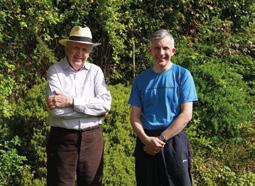
This academic year, St Mary’s Music School celebrates its 50th year as an instrumental music school – that is half a century of nurturing, inspiring, coaching and empowering musically gifted children to be the musicians, composers, conductors and teachers of tomorrow.
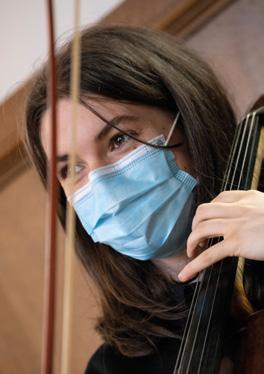
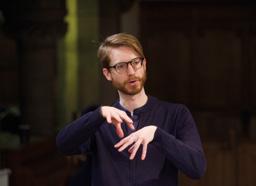

It is thanks to the generosity of our supporters that we have reached this remarkable milestone and that we continue to thrive and grow and look with ambition to the future. We would like to say a huge thank you to everyone who has supported us over the last 50 years and for helping the School on our journey so far. We hope that you will continue to be part of the St Mary’s Music School family and help to sustain our next 50 years of music-making.
To find out how you can play your part in the future of the School, or to discuss your support, please contact Caroline Libberton, Fundraising Manager. Tel: 0131 538 7766, email: clibberton@st-marys-music-school.co.uk or visit: www.stmarysmusicschool.co.uk/support-us/

ST MARY’S MUSIC SCHOOL Annual Review 2021/22 9
OUR 2021/22 BOARD
Jo Elliot (Chair, retired February 2022), Kat Heathcote (Chair, appointed February 2022), Fiona Akers, Jo Buckley, Graham Burnside (retired December 2021), John Conway, Sarah Davidson (retired March 2022), Alistair Hector, Jamie Munn and John Reid (retired February 2022).
St Mary’s Music School Trust Limited is a charity, number SC014611. Registered in Scotland, number 54504. Registered office: Coates Hall, 25 Grosvenor Crescent, Edinburgh EH12 5EL.
All images and text St Mary’s Music School 2022, unless otherwise stated. Design by IL Design | Words by Allison Traynor | Photography and images by Gary Doak Photography, Nicola Dove, Kerstin Holm, Kaupo Kikkas, Oksana Kuklina, Tina Norris, Valerie Pearson, India Reilly, Viktor Seifert, Royal High School Preservation Trust and St Mary’s Music School.
Please follow us:
facebook.com/stmarysmusicschool
twitter.com/stmarys_music
Please recycle responsibly.
instagram.com/stmarys_music
youtube/stmarysmusicschoolscotland



































